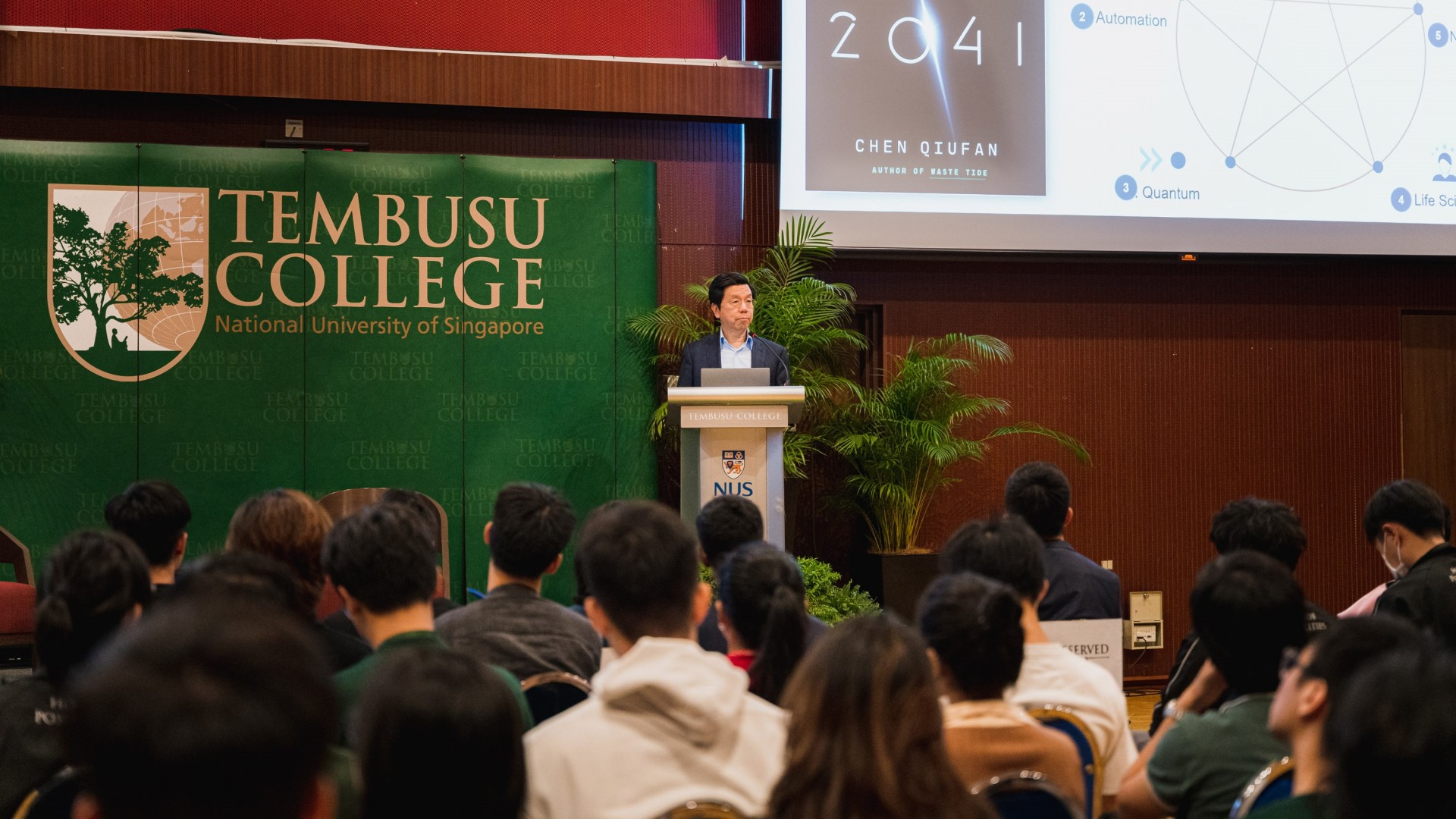Inaugural Tembusu Conversations: Artificial intelligence and the great leap into an age of plenitude
Dr Lee Kai-Fu, CEO of Sinovation Ventures and former President of Google China, envisions the future of artificial intelligence (AI) and automation to be a plenitude. As defined in Oxford English Dictionary, ‘plenitude’ refers to ‘an abundance’ and ‘the condition of being full or complete’.
Speaking at the inaugural Tembusu Conversations on 7 Sep 2022, Dr Lee outlined five key driving forces which will shape the future in his 30-minute keynote address titled “How AI Will Transform the World: Upcoming Disruptions from Life Sciences to New Energy”. These are Artificial Intelligence, Automation, New Energy, Quantum, and Life Sciences.
Initiated by Tembusu College Rector, Mrs Lim Hwee Hua, who assumed the role in July 2022, Tembusu Conversations is a new series of dialogue sessions held every semester at Tembusu College. The dialogues aim to acquaint students with issues related to technological innovations and financial, geopolitical and social shifts, through close engagement with experts from diverse fields.
An age of plenitude
These five driving forces bear great potential in transforming and changing the future as they not only can work in silos to effect change, but can also come together synergistically – such as the confluence of automation and energy which is expected to lower material and labour costs through the development of autonomous robots. Dr Lee also touched on how automation could enable medical devices in the life sciences field to become “smaller, faster, cheaper and more accurate”.
Referring to quantum computing as “the greatest transformation in computing humans will witness in our history”, Dr Lee shared that he expects quantum computing to mature in the next two decades and power the next wave of innovation. The speed at which quantum computing has advanced in recent years has put much of today’s encryption, including cryptocurrency Bitcoin, at risk of being exposed.
Living with AI
Dr Lee also took the time to respond to questions from the floor, sharing his views on how humans can adapt to living with the changes AI will bring to jobs and lifestyles, and how we can approach ethical AI. Students took the opportunity to engage with Dr Lee in the 45-minute question-and-answer session moderated by Ayushi Lahiry, a second-year student from NUS Economics and President of the NUS Economics Society.
While it is inevitable that some jobs will be replaced along with the advancement of AI in the next decade, Dr Lee emphasised that AI is currently not able to fully supplant the human in the workplace. This, therefore, underscored the importance of identifying and nurturing career skills for jobs that are intellectually challenging and hold longevity in the advancing AI landscape, whilst embracing technology as a tool and partner in one’s work. With a tongue-in-cheek reference to AI as a “glorified spreadsheet”, Dr Lee encouraged students to “be happy and aspire to do things that AI cannot do”.
Dr Lee also countered the notion that AI would lead to a loss of deep literacy – including capacity for thought, conceptualisation and reflection – in humans, pointing out that human-to-human services such as eldercare, sales and concierge services would likely see a surge in demand, due to an increased need for human interactions.
Dr Lee also acknowledged the existence of biases in AI, and sounded a clarion call for more focus on ethical AI through enhancing education on such topics for AI engineers. Alluding to the popular adage, “with great power comes great responsibility”, Dr Lee shared the need for AI engineers to develop tools which can “send more warnings to AI, train data sets which are reasonably balanced, and cleanse data”.
Referring to the multi-faceted features of AI, Dr Lee also warned that regulation of AI in itself would not serve as a panacea. He cited how computer viruses had spurred innovators to invent anti-virus software, and encouraged the invention of new technologies.
“I found his point on the need for methods to detect biased datasets to be a very critical reminder as companies can often overlook ethical considerations when developing AI, such as bias reduction, in the pursuit of efficiency,” shared Ramu Lakshmanan, a Year 1 student from NUS Computer Science. “I’ve realised the need to be aware of bias should I have to work on AI in the future”.
Jonah Lo, a first-year student from NUS Political Science, expressed his appreciation for Dr Lee’s problem-solving approach. “Perhaps inspired by his broad entrepreneurial and technological background, he noted how problems like racial bias could be resolved through technical solutions like compilers,” he said, referring to the software that translate source code written in a high-level language into machine-language instructions.
“Such angles are novel for a political science student,” he added.
Opportunities for the future
In response to how other countries such as Singapore can survive and thrive, Dr Lee offered some optimism that many opportunities are waiting to be discovered. Referring to examples of tech giants Grab and TikTok which have established offices locally, Dr Lee encouraged young people to embark on careers with such companies, which he believes will offer valuable learning points about entrepreneurship that would be helpful in founding startups. Referring to numerous successful Chinese startups which emerged from former employees of China's BAT – Baidu, Alibaba, Tencent – Dr Lee expressed his belief that the same could be achieved by future entrepreneurs in Singapore despite its small market size.
By Tembusu College







